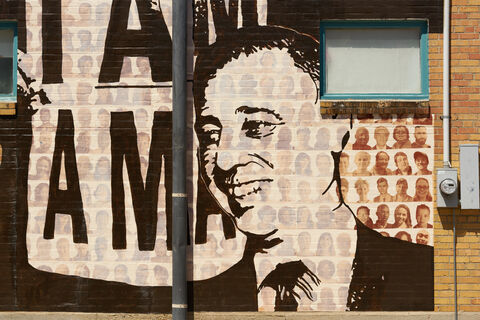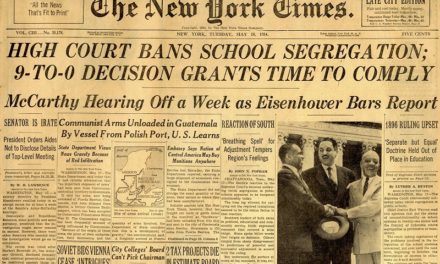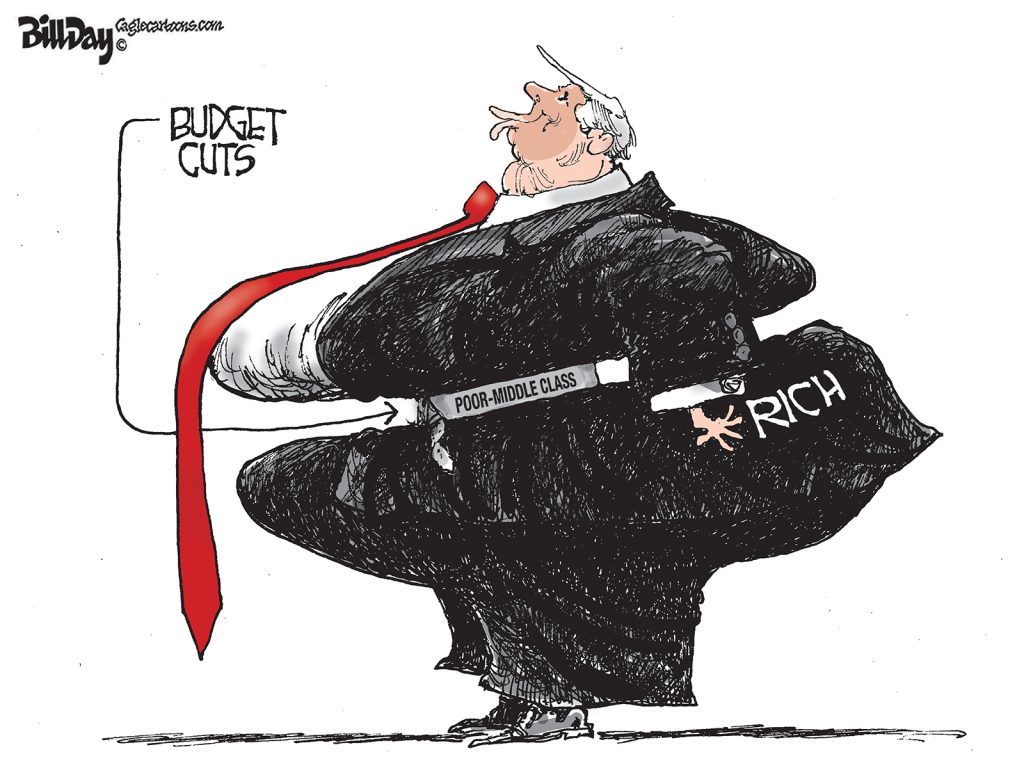It was April 5, 1968, and less than 24 hours had passed since Dr. Martin Luther King Jr. was murdered on the balcony of the Lorraine Motel.
Memphis ministers, led by Temple Israel Rabbi James Wax, had worked behind the scenes to open up lines of communications between the sanitation workers union and Memphis Mayor Henry Loeb who remained recalcitrant in his anti-labor stance.
The ministers began April 5 with a meeting to pray for Memphis and for people of good will to call for a union agreement to be reached. To that date, the ministers had resisted the call to march on City Hall, but that today, it was clear that it was time for action and to take a stand.
Led by Rabbi Wax and Dean William Dimmick of St. Mary’s Episcopal Cathedral, 250 Black and White ministers marched from the cathedral to City Hall to confront Mr. Loeb. Rabbi Wax was furious at what he considered a tragedy that could have been avoided except for the mayor’s racism and when the group was ushered into Loeb’s office, he spoke emotionally and directly to the mayor in a way that attracted national media coverage.
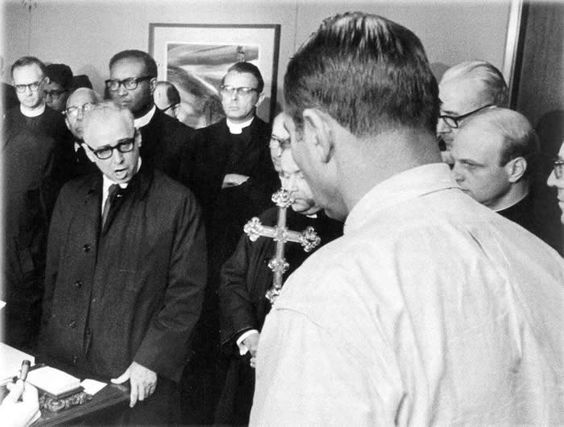 With righteous anger, he spoke to Mr. Loeb directly:
With righteous anger, he spoke to Mr. Loeb directly:
“We come here this morning with a great deal of sadness in our hearts but also with a great deal of anger, sir. What has happened in our city is the result of injustice and oppression and the lack of human decency and concern for human beings…shall be ruled with justice and justice for all. I realize we live in a society of law and order. We must have laws, but I would remind you most respectfully, sir, there are laws that are greater than the laws of Memphis and of Tennessee. The laws of God, and the laws of God are not subject to any Gallup poll. Speak out in favor of human dignity for every person. Let us not hide behind legal technicalities. Let us not wrap ourselves up in slogans. Let us do the will of God for the good of the city.”
(Listen to Rabbi Wax’s statement to Mr. Loeb here,)
Context
Just three months earlier, Rabbi Wax had prayed at Mayor Loeb’s inauguration. Loeb was the first mayor elected after the commission form of government from 1909 had been replaced by a new mayor-Council structure. Rabbi Wax was a member of the committee that advocated fiercely for the new form of government but here he was on April 5, confronting its first mayor.
As the first rabbi to head the Memphis Ministers Association, Rabbi Wax had worked hard for the faith community to be a force for improving race relations and ending Jim Crow in Memphis.
His criticism of Mr. Loeb was not surprising to the people who knew him. After all, if there was a theme that ran through his entire life, it was his commitment to social justice.
That was the inspiration for last year’s exhibit at Temple Israel, Righteous Among Men: Rabbi James A. Wax, A Life Dedicated to Social Justice. The exhibit was inspired by Susan Adler Thorp in the wake of George Floyd’s murder and who, with me, wrote the narrative and identified the exhibit artifacts. The exhibit was curated by Laura Gray McCann.
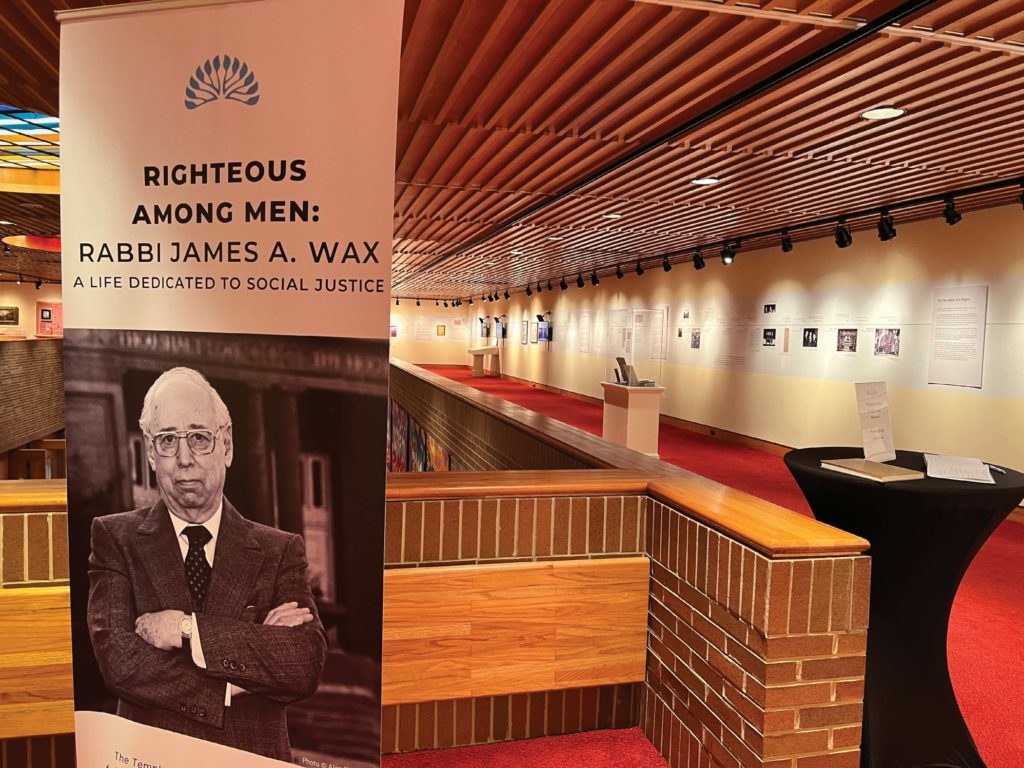 The exhibit lasted for about a year and has now been converted into a website – www.rabbiwax.org – that captures all the documentation, videos, letters, and more. The video of his statements to Mayor Loeb can be seen at the April 5, 1968, date on the timeline.
The exhibit lasted for about a year and has now been converted into a website – www.rabbiwax.org – that captures all the documentation, videos, letters, and more. The video of his statements to Mayor Loeb can be seen at the April 5, 1968, date on the timeline.
The Improbable Journey
It was an improbable journey that took Jimmy Wax from the hard scrabble mining town of Herculaneum, Missouri, to become a staunch lifetime advocate and defender of social justice.
He never lost sight of his life’s mission – to speak for those who had no voice, to speak out against injustice and bigotry, and to inspire his city and his congregation to risk everything in pursuit of decency, equality, and understanding.
His commitment to social justice was built on his commitment to America, the country where his parents moved to escape the anti-Semitic pogroms in the Pale of Settlement in Russia in 1910. From his teenage years as a prize-winning orator and debater to the end of their lives, his parents were deeply patriotic about their new country and endowed him with a love of the United States and a desire for it to fulfill its full promise for every person.
Even as a teenager, he was frequently asked to speak about patriotism and our common humanity. He was invited to speak to civic groups and at the Methodist Church and even served as the keynote speaker at the groundbreaking of an African American Baptist Church in his hometown.
In Herculaneum, Missouri, his family was the only Jewish one in town. As a result, he had no Jewish friend, no town synagogue, no Bar Mitzvah, and he couldn’t speak Hebrew. But Herculaneum was the seedbed for his lifelong concern for the “little guy,” which was kindled even more when he attended a service in St. Louis where Rabbi Ferdinand Isserman challenged Temple youth to fight injustice. After being accepted at Hebrew Union College, he learned that social justice was the heart of Judaism, and from his earliest sermons, he focused on this religious imperative.
The Voice for the Voiceless
He moved to Memphis in 1946 to accept the assistant rabbi post at Temple Israel and in 1954, he was installed as senior rabbi.
At his installation, his predecessor, Rabbi Harry Ettelson said: “James Wax would not speak as Temple Israel wants him to speak. He must speak as God wants him to speak.” In his reply, Rabbi Wax staked out his claim to a social justice ministry: “Social justice, the genuine concern for one’s fellow man, is the cornerstone upon which the world is built. I shall in the course of time say things with which you shall not agree. Mine is the duty not to listen to man, but to listen to God.”
After moving to Memphis, he quickly became active in mental health and desegregation. He was the first president of the local mental health association and he was the first Jewish president of the Memphis Ministers Association. He was also a member of various civic and charitable groups and received numerous awards for his contributions to Memphis.
From the beginning, Wax’s strong stand on equal rights for African Americans set him apart in a culture where that was far from the norm. In a 1953 speech he told the Brotherhood of Temple B’nai Israel:
Every human being, regardless of his nationality, religion or race, was created in God’s image. Every human personality bears the imprint of divinity. Whatever we do that harms another person, that dwarfs his divinity. Whatever we do that harms another person that dwarfs his being, that denies him the opportunity to achieve his utmost potentialities is a sin. Prejudice, like robbery, is a sin. Hatred, like adultery, is a sin. No person is either a good Christian or a good Jew who is guilty of the sin of bigotry and intolerance. Judaism and Christianity, the dominant religions of the Western World, enjoin us to love God and to love our fellow man.”
Truth To Power
By 1956, his leadership led the Tri-State Defender to honor him for “his consistent effort to bring about peace and harmony between the races.” Two months later, he withdrew from a Religious Emphasis Week speaking engagement at University of Mississippi in protest against the college’s cancellation of an invitation to a White minister who supported the NAACP and opposed segregation.
But his fiery comments to Mayor Loeb were not the last time he spoke truth to power.
Seven years later, Rabbi Wax would be in the news again when he stood up to Governor Ray Blanton in 1975 when he attempted to politicize hiring at the state mental hospital. For Rabbi Wax, mental health was a core part of social justice. In 1950, he was elected president of the newly formed Memphis-Shelby County Mental Hygiene and later was named by Governor Frank Clement to Tennessee Mental Health Commission where he served for 25 years.
Rabbi Wax gave his last sermon as senior rabbi on March 11, 1978, after 32 years associated with Temple Israel and after leading the effort to build a new synagogue. Local media published glowing articles about his impact on the history of Memphis. He continued to write columns about social justice for local media, taught a popular course at Memphis Theological Seminary, and continued to serve as rabbi to the Jewish communities in small Mid South towns.
He died October 17, 1989, after suffering an aneurysm while conducting Yom Kippur services in Helena, Arkansas. His last words were about social justice: the moral right of every person to have decent, affordable health care.
The April 5, 1968, Sermon
Several hours after speaking truth to Mr. Loeb, he is remembered for one of his briefest and most powerful sermons:
Speaking this morning to the Mayor of our city, I said to him that I spoke with mixed emotions, of sadness and of anger, of deep and righteous resentment, and the view which I expressed is the view of the clergy of the city of Memphis. I know there are people in our city tonight who are not sad at what happened last night. I know there are some people in our city who might even be glad. I remember a few weeks ago at the Rotary Club when the television newscaster made his five minute report announcing that Dr. Martin Luther King was coming to Memphis there were some who sneered, and some who mocked the announcement. But I wonder who those people are contrasted with Martin Luther King. Who is this man, Martin Luther King that the President of the United States should proclaim a national day of prayer? Whose death is mourned in the capitals of the world? Whose death is deeply regretted by responsible people, decent people, wherever they may live? Who is this man whose name was sneered and mocked by some of our so-called civic civic leaders? I shall answer very simply and briefly, Martin Luther King was a prophet, a prophet like Amos and Isaiah and Jeremiah, a man who walked in the footsteps of Moses. And (if I were speaking in a Christian congregation) walked in the footsteps of Jesus.
What did Martin Luther King do? Martin Luther King helped to bring freedom to the oppressed people yet in this nation. He fought to break the chains that have oppressed people, he sought to give men dignity, he sought to make this a better world in which to live. Oh, how the cynics sneered when they gave him the Nobel Peace Prize. they said, “What did he do to deserve it?” How little can people be? Here was a man in the tradition, the grandest traditions of Judaism and Christianity, bringing freedom to people. And we white hypocrites that speak about freedom for all people know full well that not many miles from here Negroes could not vote. In this very city, called a place of good abode, because their skin what black, they had to sit in the back of the streetcar. They were not even given the dignity of their name.
Martin Luther King was one of the greatest men of this century because he personified the greatest teachings in Judaism and in Christianity, and he did it without violence. He sought to appeal to the heart and the conscience of man.
When I memorialized or tried to memorialize the late President John F. Kennedy, standing in this place, I said, “You Judge a man not merely by the friends he has, but by his enemies.” Who are the enemies of Martin Luther King? Segregationists! A segregationist is a bigot. A segregationist violates the laws of the Torah. A segregationist desecrates Judaism. These are the people who dislike Martin Luther King.
**
***
Join us at the Smart City Memphis Facebook page for daily articles, reports, and commentaries relevant to Memphis and the conversations that begin here.

